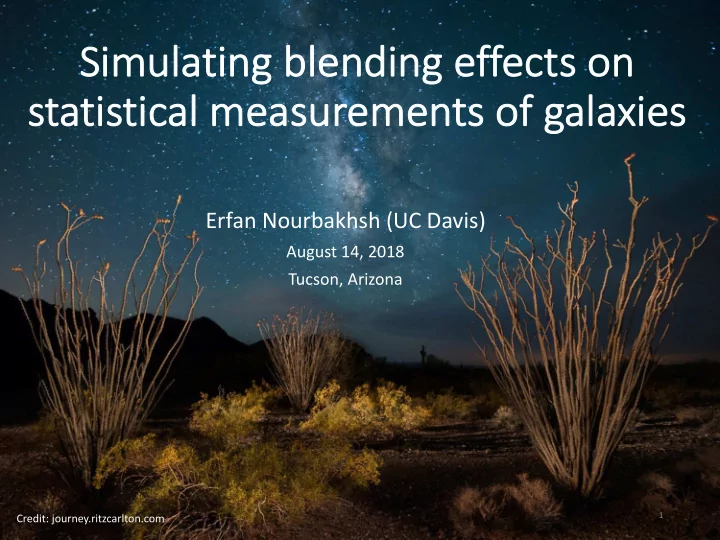

Si Simulating blending ef effects on statistical mea easurem emen ents of of galaxi xies es Erfan Nourbakhsh (UC Davis) August 14, 2018 Tucson, Arizona 1 Credit: journey.ritzcarlton.com
• Galaxy blending - as a 2D phenomenon - affects: • Shape measurements • Number counts • Fluxes and colors • Blending will affect Clustering+WL cosmological probes (differently) • How sensitive is the inferred cosmology to blending? What if we combine multiple cosmological probes? • Blending imitation using the truth (simulation) RED: Subaru GREEN: HST • Analysis • Two-point statistics results • Covariance matrix • Cosmological parameter estimation • Summary Dawson+16
Bin 4 Bin 3 Bin 2 Bin 1 z 3
| Same Underlying Dark Matter | 4
• Buzzard_v.1.6 (DeRose et al. 2028, in prep.) • We imitate blending by finding close pairs within a separation angle threshold that gives the predicted blend fraction by Dawson+16 ~ 10% for our sample <1.5’’ proximity " $ C: luminosity centroid ! : position vector ! " " # 5
LSST i<23 6
Unblended Blended Galaxy-Galaxy 7
blended - unblended 8
Unblended Blended Shear-Shear 9
Ω " = 0.29, ) * = 0.82 Ω " = 0.27, ) * = 0.89 Shear-Shear 10
Shear-Shear 11
Unblended Blended Galaxy-Shear 12
Galaxy-Shear 13
• Blending affects the extracted cosmology from the cosmological probes differently • There is a selection bias due to blending • Our cosmological probes are >3D and the effect we are correcting for (blending) happens in 2D (although it indirectly affects the third dimension through photo-z) • Our goal is to see if these effects can be suppressed if we jointly analyze multiple 3D probes since they share the same dark matter distribution 14
! " # 16
17
18
Buzzard_v.1.6 (DeRose et al. 2028, in prep.) – I had to fix some bugs 143 jackknife regions to get the sample variance and covariance matrix 19
20
21
• DC2 image-based catalog can be used instead of Buzzard and can give us more realistic results • Convolving our shears with a ground-based PSF that circularizes all galaxy images • To test if we can decrease the systematic error by throwing out blends that are likely to have color gradient • A better covariance matrix for the joint probes is crucial 22
Recommend
More recommend